A Devastating Financial Reversal

In the quiet suburbs of Perth, Australia, Virginia Giuffre’s world crumbled in early April 2025 when she learned that her hard-won multi-million-pound settlement from Prince Andrew had slipped through her fingers. Sources close to the family reveal that Giuffre, already battling the scars of her past, was “extremely distressed” by this unexpected loss, which came just two weeks before her tragic suicide on April 25 at age 41. This heartbreaking twist adds a layer of profound sorrow to her story, raising questions about the true cost of seeking justice against the powerful. What began as a landmark victory in 2022—a settlement reportedly worth £12 million—had morphed into a symbol of fleeting triumph, eroded by legal entanglements and unforeseen financial pitfalls.

The Landmark Settlement Revisited
Giuffre’s legal battle with Prince Andrew stemmed from her allegations of sexual assault when she was 17, linked to her trafficking by Jeffrey Epstein and Ghislaine Maxwell. In February 2022, the Duke of York agreed to an out-of-court settlement, avoiding a trial that could have exposed royal secrets. The agreement included an undisclosed sum paid to Giuffre and a donation to her charity, Victims Refuse Silence, aimed at supporting sex trafficking survivors. Prince Andrew, while denying wrongdoing, expressed regret for his Epstein association. The payout, confirmed paid in March 2022, was seen as a vindication for Giuffre, who had endured years of scrutiny and threats. Yet, this financial lifeline, intended to provide security, became entangled in disputes over taxes, legal fees, and investment losses, leading to its partial forfeiture.
Unraveling the Loss
Newly emerged documents and family statements paint a picture of mounting despair. In late March 2025, Giuffre was involved in a severe car accident, exacerbating her physical and emotional pain. Amid recovery, she faced a bombshell: a portion of the settlement funds, invested in volatile assets to sustain her advocacy work, had been depleted due to market crashes and alleged mismanagement by advisors. Compounded by ongoing legal costs from related Epstein cases, Giuffre reportedly lost access to millions, leaving her feeling betrayed and financially vulnerable. “She fought so hard for that money, not for luxury, but for justice and healing,” a close friend confided. This reversal contrasted sharply with her public image as a resilient advocate, highlighting the hidden toll of prolonged legal warfare against elite figures.
Echoes of Trauma in Her Final Weeks
Giuffre’s distress manifested in isolation and frantic communications with her legal team, pleading for resolutions that never came. Her suicide note, partially disclosed by family, alluded to overwhelming burdens: “The fight took everything, even the wins turned to ash.” This period coincided with preparations for her posthumous memoir, “Nobody’s Girl,” set for release in October 2025, which details her Epstein ordeals and critiques systemic failures. Conspiracy theories swirled on social media, with some questioning if external pressures contributed, though authorities ruled it suicide. Her father publicly doubted the official narrative, insisting “someone got to her,” fueling debates about the dangers faced by whistleblowers.
Broader Implications for Survivors
This tragedy underscores the precarious path of survivors pursuing accountability. Giuffre’s case exposed not just individual abuses but institutional protections for the wealthy. The lost settlement symbolizes how justice can be pyrrhic—winning in court but losing in life. Advocacy groups call for better support systems, including financial safeguards for victims. As her memoir approaches, it may reveal more about the settlement’s aftermath, potentially reigniting scrutiny on Prince Andrew and the monarchy. Giuffre’s death, far from silencing her, amplifies her voice, reminding the world that the cost of justice can be unbearably high.
A Lasting Legacy Amidst Sorrow
In death, Giuffre leaves a legacy of courage, having founded organizations that aided countless survivors. Her story prompts reflection: How do we protect those who speak out? As tributes pour in, from global leaders to fellow victims, the focus shifts to preventing such heartbreaks. Yet, the unanswered questions linger—what if the system had shielded her as fiercely as it did the accused? Giuffre’s final twist serves as a stark warning, urging reforms before more voices are lost forever.
Leave a Reply